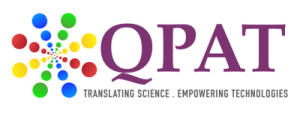QPAT is a pioneer in science and molecular engineering of living cells, enzymes, proteins, small molecules, API, and processes (upstream and downstream) with pilot as well as plant engineering knowledge to make the safe, efficacious and affordable products for society. We help invent and develop simple and sustainable solutions leading to successful scaled up to commercial plants.
Our research and development strategy is a unique approach involving systematic development through understanding of physico-chemical behaviour of molecules. The strong fundamental understanding of the team integrating science and engineering with smart work gives us successful roadmap to come up with innovative yet simple and scalable technologies for various industries.
QPAT prioritizes the targets and technologies that find most promising ways to maximize productivity and purity with our strengths mentioned below:
- Expertise in various categories of products: Proteins, enzymes, synthetic API, natural products, oil and fats, waxes and surfactants, impurity separation, antibiotics, vitamins, antioxidants, natural colours, flavours, nutraceuticals, health suppliments, food and feed ingredients, carbohydrates, oligosaccharides, sugars and sugar alcohols, organic acids, organic solvents and fine chemicals, fermentation products, biopharmaceuticals, biologicals, peptides etc.
- Adsorptive and chromatographic separations: Both kinetic and thermodynamic strategies are explored for best possible solution for simple and difficult separation problems. We also develop continuous chromatographic solutions for variety of applications.
- Membrane filtration: coarse filtration, microfiltration (MF), Ultrafiltration (UF), Nanofiltration (NF) and Reverse osmosis (RO) are the key operations used based on requirements of clarity, purification factor/purity, concentration and polishing required for particular product.
- Extraction: Solid-liquid extraction (SLE) and liquid-liquid (LLE) extraction involving indigenously engineered continuous extractors are done to arrive superior efficiency and can be used for difficult exactions as well as unstable molecules.
- Solid-liquid separation: Specifically done for fermentation, agro-based and natural products.
- Evaporation and distillation: concentration of product and recycle of solvent and water for specific streams involves use of efficient evaporators for lab, pilot and commercial scale operations.
- Precipitation and crystallization: recovery of product in solid form as amorphous or in crystals can be designed with use of batch or continuous systems.
- Drying and dehydration: spray, freeze and try drying or continuous drying technology is developed depending on need and type of product. Dehydration of food and solvents is done using innovative technique with lesser energy requirement and at reduced process losses.
- Enzymatic or biocatalysis: synthesis, hydrolysis or biotransformation of various synthetic and natural products for pharmaceutical, nutraceutical and flavour applications
- Fermentation and development of molecules: This involves genetic engineering to modify the biomolecules, their expression followed fermentation for production. Technique like batch, fed-batch, continuous, high cell density systems etc. are developed for various products.
- Analysis and characterization: Success of any process and product is governed by strong analytical techniques. Each process is developed and controls required are established with the help of various analytical tools and methods.
- Process synthesis, Integration and process engineering: A complete process steps are designed, optimized using QbD approach and integrated for the benefit of overall manufacture in terms of recovery, purity, reducing number of steps, simple and easy operation, zero liquid discharge and process engineering. The aim is to make processes scalable, economical with reduced footprint, and capital expenditure yet delivering quality product.
